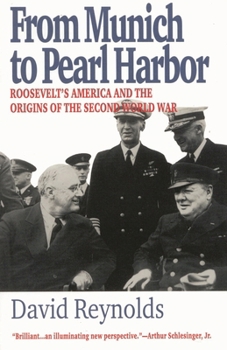From Munich to Pearl Harbor: Roosevelt's America and the Origins of the Second World War
(Part of the American Ways Series Series)
Select Format
Select Condition 
Book Overview
Arguing that the period from 1938 to 1941 was a turning point in modern American history, Mr. Reynolds shows how Franklin Roosevelt led Americans into a new global perspective on foreign policy.
Format:Paperback
Language:English
ISBN:1566633907
ISBN13:9781566633901
Release Date:August 2002
Publisher:Ivan R. Dee Publisher
Length:224 Pages
Weight:0.86 lbs.
Dimensions:0.7" x 5.4" x 8.3"
Customer Reviews
2 ratings
Good Resource Material
Published by Thriftbooks.com User , 17 years ago
I had to read this book as part of a foreign relations class I'm taking. It did a great job of presenting the historical context without getting too dull or bogged down with details. In addition, I really liked how well it portrayed FDR as a person, rather than just as a political figure. You get more insight into his personality, personal beliefs, and ideals with this book than with most other historical accounts I've come accross. If you're more interested in the social and political aspects of war than the details of battles and treaties, you'll probably really like this book.
An insightful look at how FDR edged us into World War II.
Published by Thriftbooks.com User , 22 years ago
For those people who thought Pearl Harbor brought us into the Second World War, Reynolds argues that FDR's actions were bringing us closer to an alliance with Churchill's Great Britain and Stalin's USSR. Pearl Harbor was the last action which convinced the American public that war was necessary. Before that, Reynolds argues that the isolationist mood in the U.S. was high and oppossed to more involvement in Europe. Roosevelt helped as much as possible through the destroyer deal and lend lease to help Great Britain and the USSR. If it hadn't been for Pearl Harbor, NAZI Germany may have overwhelmed the USSR and Great Britain. In this thesis, he also argues that signal intelligence was missed which resulted in Pearl Harbor, but there was no conspiracy.Reynolds book is somewhat dry, but the details show how FDR worked to get us into the good war. He led the USA into public opinion about the reasons why the country should support the Soviet Union and Great Britain.






